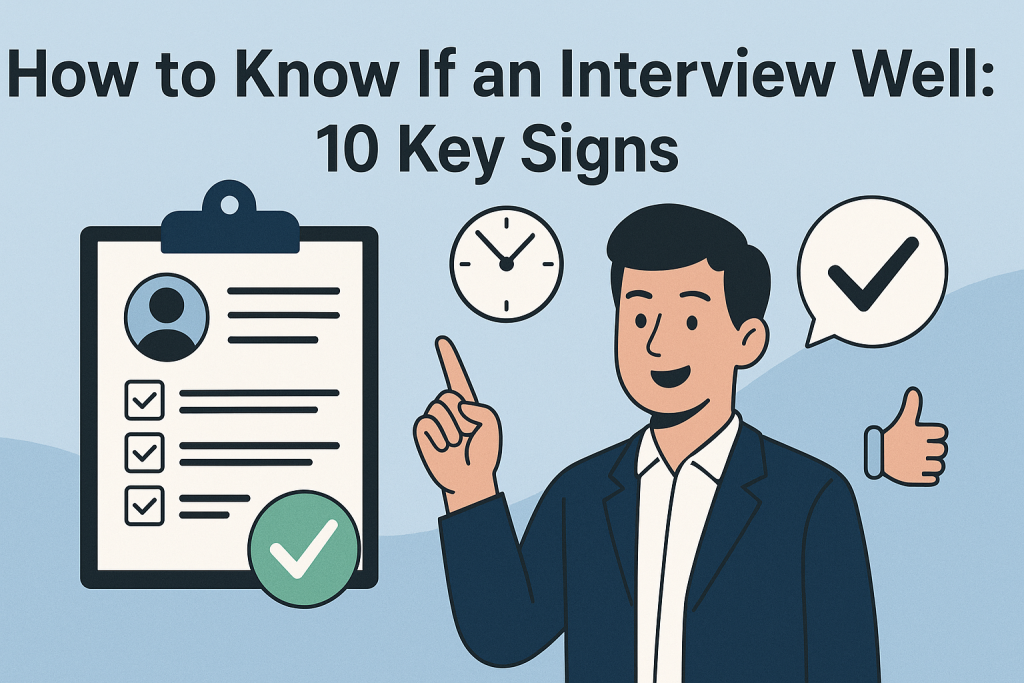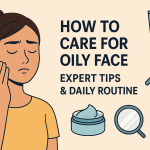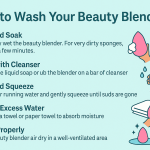Walking out of a job interview can bring a rush of emotions—relief, anxiety, excitement, and uncertainty. One of the most common questions job seekers ask themselves is, “How do I know if my interview went well?” While every interview is unique, there are certain telltale signs that indicate your meeting with a potential employer was successful.
In this comprehensive guide, we break down the top indicators that suggest your interview was a hit, offer practical insights on what to look for, and share post-interview tips to help you best position yourself for landing the job.

Why It’s Important to Assess Your Interview Performance
Understanding how your interview went is not just about easing your nerves. It can also help you:
- Adjust your follow-up strategy
- Prepare for next steps (such as further interviews or assessments)
- Gain valuable insight for future interviews
- Decide whether the company is the right fit for you
Top 10 Signs Your Interview Went Well
1. The Conversation Felt Natural and Engaging
When an interview turns into a genuine conversation, it’s a great sign. If your discussion flowed smoothly, with both you and the interviewer exchanging ideas and building rapport, you likely made a positive impression. Active engagement from the interviewer—like nodding, smiling, sharing stories, or even light jokes—suggests they’re interested in you as a candidate.
2. You Received Positive Verbal and Nonverbal Feedback
Subtle cues can provide insight into your performance. Look for:
- Frequent smiles and eye contact
- Affirmations such as “That’s a great answer” or “Excellent example”
- Head nodding and attentive listening
- Enthusiastic responses to your questions
These gestures signal approval and genuine interest.
3. The Interview Ran Longer Than Scheduled
Most hiring managers have back-to-back meetings. If your interview went over the allotted time, it often means the interviewer wanted to learn more about you rather than stick to the script. This is a strong indication that you’ve piqued their interest and that your skills are a good match for the role.
4. The Interviewer Sold the Role and the Company
If the interviewer spent part of the meeting selling you on the perks of the job, the company culture, career growth, or benefits, it’s a strong endorsement. When employers highlight why you should want the job, it usually means they see you as a serious contender.
5. You Were Introduced to Other Team Members
Being introduced to future colleagues or higher management during or after the interview is a positive sign. These introductions are often reserved for promising candidates. The company may want to see how you fit with the team or get buy-in from other decision-makers.
6. The Interviewer Discussed Next Steps in Detail
If the interviewer described what comes next—such as timelines, second interviews, assessments, or references—they’re likely considering moving you forward in the process. Vague responses or a lack of clarity can sometimes signal otherwise, but detailed next steps are encouraging.
7. You Were Asked About Your Other Applications or Availability
Questions like “Are you interviewing anywhere else?” or “When could you start?” suggest that the employer is gauging how quickly they need to act if they want to hire you. This often points to genuine interest.
8. The Interviewer Shared Their Contact Details
If they encouraged you to stay in touch, gave you a business card, or offered direct contact information for questions, it’s a good sign they want to maintain the connection.
9. You Left With Clear Answers and a Good Feeling
Reflect on your own impressions. Did you feel confident and comfortable during the interview? Were your questions answered thoroughly? Trust your instincts—if you left feeling positive, you likely made a strong impression.
10. You Received a Quick Follow-Up
Sometimes, a fast follow-up—such as a thank you email, request for references, or scheduling the next round—shows that you’re at the top of their list. While not always immediate, a prompt response is usually a strong indicator.
Signs an Interview May Not Have Gone Well
While it’s important to focus on positive signs, being aware of red flags can help you manage expectations:
- The interview felt rushed or abruptly ended
- Few or no follow-up questions were asked
- Disinterested or distracted interviewer behavior
- Minimal discussion of next steps
- Generic responses to your questions
What to Do After the Interview
Send a Thank You Email
Regardless of how the interview went, always send a personalized thank you note within 24 hours. Express gratitude for their time, reiterate your interest in the role, and mention something specific from your conversation.
Reflect on the Experience
Take notes on what went well, where you could improve, and any important details that came up. This will help you for future interviews or subsequent rounds with the same company.
Follow Up Appropriately
If you haven’t heard back within the timeline given (or within a week if no timeline was provided), it’s appropriate to send a polite follow-up email to inquire about your application status.
Frequently Asked Questions
How soon should I expect to hear back after a good interview?
Response times vary by company and position. Generally, you might hear back within one to two weeks, but it’s not unusual for the process to take longer, especially for roles with multiple interview rounds.
Can I ask for feedback if I don’t get the job?
Yes, although not all companies provide detailed feedback. If you’re not selected, sending a brief message requesting feedback shows professionalism and can yield valuable insights for your job search.
Should I stop applying elsewhere if the interview went well?
No matter how confident you are, continue your job search until you’ve received and accepted a formal offer. This ensures you have options and aren’t left waiting unnecessarily.
Conclusion: Trust the Signs, But Stay Proactive
While these signs can help you gauge your interview performance, remember that every hiring process and interviewer is different. Trust your instincts, but don’t read too much into any one indicator. The best strategy is to follow up professionally, reflect on your experience, and continue seeking new opportunities until you land the right job.
With preparedness, positivity, and attention to feedback, every interview—successful or not—brings you closer to your dream job.

